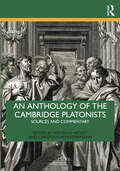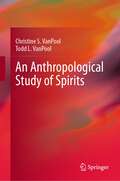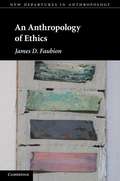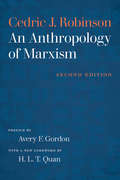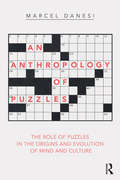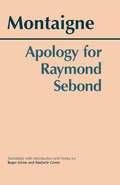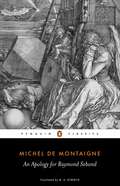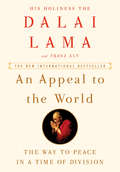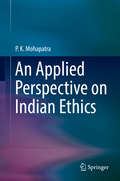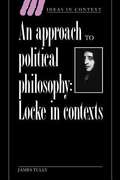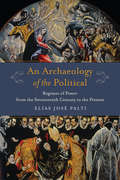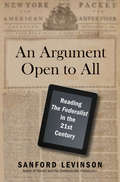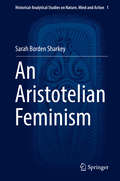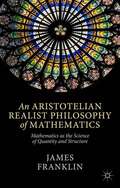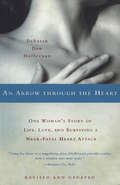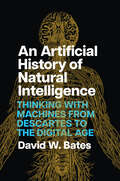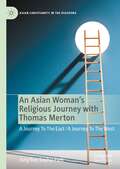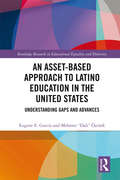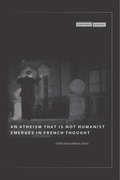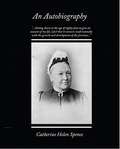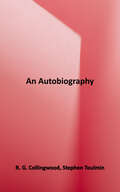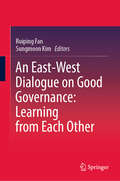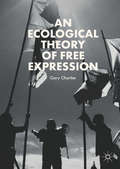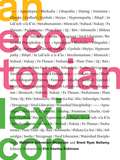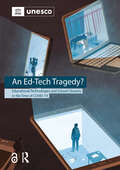- Table View
- List View
An Anthology of the Cambridge Platonists: Sources and Commentary
by Douglas Hedley Christian HengstermannNotwithstanding their neglect in many histories of ideas in the West, the Cambridge Platonists constitute the most significant and influential group of thinkers in the Platonic tradition between the Florentine Renaissance and the Romantic Age. This anthology offers readers a unique, thematically structured compendium of their key texts, along with an extensive introduction and a detailed account of their legacy. The volume draws upon a resurgence of interest in thinkers such as Benjamin Whichcote, 1609–1683; Ralph Cudworth, 1618–1688; Henry More, 1614–1687; John Smith, 1618–1652, and Anne Conway 1631–1679, and includes hitherto neglected extracts and some works of less familiar authors within the group, like George Rust 1627?–1670; Joseph Glanvill, 1636–1680, and John Norris 1657–1712. It also highlights the Cambridge Platonists’ important role in the history of philosophy and theology, influencing luminaries such as Shaftesbury, Berkeley, Leibniz, Joseph de Maistre, S.T. Coleridge, and W.R. Emerson. An Anthology of the Cambridge Platonists is an indispensable guide to the serious study of a pivotal group of Western metaphysicians and is of great value for both students and scholars of philosophy, literature, history, and theology. Key Features The only systematic anthology to the Cambridge Platonists available, facilitating quick comprehension of key themes and ideas Uses new translations of the Latin works, vastly improving upon faulty and misleading earlier translations Offers a wide range of new perspective on the Cambridge Platonists, showing the extent of their influence in early modern philosophy and beyond.
An Anthropological Study of Spirits
by Todd L. VanPool Christine S. VanPoolThis book discusses the cultural importance of spirits, what spirits want, and how humans interact with them, using examples from around the world and through time. Examples range from the vengeful spirits of the Zulu that cast lightning bolts from clear skies to punish wrongdoers, to the benevolent Puebloan Kachina that encourage prosperity, safety, and rain in the arid American Southwest. The case studies illustrate how humans seek to cooperate (or counteract) spirits to heal the physical and spiritual ailments of their people, to divine the truth, or to gain resources. Building from their cross-cultural analyses, the authors further discuss how our physiology and psychology impact our interaction with the spirits. Readers will come away with an appreciation of the beauty and power of the spirits that continue to shape the lives of people around the world.
An Anthropology of Ethics
by James D. FaubionThrough an ambitious and critical revision of Michel Foucault's investigation of ethics, James Faubion develops an original program of empirical inquiry into the ethical domain. From an anthropological perspective, Faubion argues that Foucault's specification of the analytical parameters of this domain is the most productive point of departure in conceptualizing its distinctive features. He further argues that Foucault's framework is in need of substantial revision to be of genuinely anthropological scope. In making this revision, Faubion illustrates his program with two extended case studies: one of a Portuguese marquis and the other of a dual subject made up of the author and a millenarian prophetess. The result is a conceptual apparatus that is able to accommodate ethical pluralism and yield an account of the limits of ethical variation, providing a novel resolution of the problem of relativism that has haunted anthropological inquiry into ethics since its inception.
An Anthropology of Marxism (Race And Representation Ser.)
by Cedric J. RobinsonAn Anthropology of Marxism offers Cedric Robinson's analysis of the history of communalism that has been claimed by Marx and Marxists. Suggesting that the socialist ideal was embedded both in Western and non-Western civilizations and cultures long before the opening of the modern era and did not begin with or depend on the existence of capitalism, Robinson interrogates the social, cultural, institutional, and historical materials that were the seedbeds for communal modes of living and reimagining society. Ultimately, it pushes back against Marx's vision of a better society as rooted in a Eurocentric society, and cut off from its own precursors. Accompanied by a new foreword by H.L.T. Quan and a preface by Avery Gordon, this invaluable text reimagines the communal ideal from a broader perspective that transcends modernity, industrialization, and capitalism.
An Anthropology of Puzzles: The Role of Puzzles in the Origins and Evolution of Mind and Culture
by Marcel DanesiAn Anthropology of Puzzles argues that the human brain is a "puzzling organ" which allows humans to literally solve their own problems of existence through puzzle format. Noting the presence of puzzles everywhere in everyday life, Marcel Danesi looks at puzzles in society since the dawn of history, showing how their presence has guided large sections of human history, from discoveries in mathematics to disquisitions in philosophy. Danesi examines the cognitive processes that are involved in puzzle making and solving, and connects them to the actual physical manifestations of classic puzzles. Building on a concept of puzzles as based on Jungian archetypes, such as the river crossing image, the path metaphor, and the journey, Danesi suggests this could be one way to understand the public fascination with puzzles. As well as drawing on underlying mental archetypes, the act of solving puzzles also provides an outlet to move beyond biological evolution, and Danesi shows that puzzles could be the product of the same basic neural mechanism that produces language and culture. Finally, Danesi explores how understanding puzzles can be a new way of understanding our human culture.
An Apology for Raymond Sebond
by Michel De Montaigne M. A. ScreechIn his introduction, Screech writes: "Montaigne gives his readers the fruits of his own wide reading and of his own reflections upon it, all measured against his personal experience during a period of intellectual ferment and of religious and political disarray. Montaigne never let himself be limited by his office or station. As husband, father, counsellor, mayor, he kept a critical corner of himself to himself, from which he could judge in freedom and seek to be at peace with himself. He does not crush his reader under the authority of the great philosophers: he tries out their opinions and sees whether they work for him or for others. Traces of Plato, Aristotle, Plutarch, Cicero, St Augustine or of his own contemporaries can be found in every page he wrote, but they are skilfully interwoven into his own discourse, being renewed and humanized in the process. And he hardly ever names them. An Apology For Raymond Sebond has all these qualities, despite its being the longest piece Montaigne ever wrote. In it, Montaigne remains triumphantly himself."
An Apology for Raymond Sebond
by Michel MontaigneAn Apology for Raymond Sebond is widely regarded as the greatest of Montaigne's essays: a supremely eloquent expression of Christian scepticism. An empassioned defence of Sebond's fifteenth-century treatise on natural theology, it was inspired by the deep crisis of personal melancholy that followed the death of Montaigne's own father in 1568, and explores contemporary Christianity in prose that is witty and frequently damning. As he searches for the true meaning of faith, Montaigne is heavily critical of the arrogant tendency of mankind to create God in its own image, and offers his personal reflections on the true role of man, the need to eschew personal arrogance, and the vital importance of faith if we are to understand our place in the universe. Wise, perceptive and remarkably informed, this is one of the true masterpieces of the essay form.
An Appeal to the World: The Way to Peace in a Time of Division
by Dalai Lama Franz AltThe #1 international bestseller that “makes the case for unity in a world rife with divisions.” Features exclusive new material on the Trump presidency (The New York Times Book Review).In this brief yet profound address to global humanity, His Holiness the Dalai Lama of Tibet reveals that we all hold the seeds of world peace within us: “I see with ever greater clarity that our spiritual well-being depends,” the Nobel Peace Prize winner writes, “on our innate human nature, our natural affinity for goodness, compassion, and caring for others.”Already a major international bestseller, An Appeal to the World, the new book by one of the most revered spiritual leaders of our time, outlines both the inward and outward paths to peace, addressing a wide range of contemporary topics—from the rise of nationalism, Trump presidency, refugee crisis, climate catastrophes, and materialism to meditation, universal ethics, and even neuroscience. Here is a small book that can truly change the world.“Always inspiring and accessible, this lovely book is, itself, readers will discover, worth meditation and contemplation.” —Booklist“The authors explain how patience, forbearance, humility, and generosity are essential components of secular ethics. This revolution in thinking has the potential to increase empathy and compassion, as life is interdependent and our actions have global impacts.” —Library Journal
An Applied Perspective on Indian Ethics
by P. K. MohapatraThis book presents a novel interpretation of major problems of Indian ethics from an applied ethical perspective. It approaches prominent theories like Dharma, Karma and Purusarthas from a critical point of view, so as to render them logically consistent and free from some standard limitations. Ethical theories are meant to provide guidance for life, but quite often many of our celebrated theories appear to be inapplicable or difficult to apply in practical life. Indian ethical theories are of special significance to this problem because they have in them rich potentials of applicability as much as many of them typify inapplicable abstract theories of morals. The book incorporates a wealth of research on ethical theories, keeping in view the spirit of ethics and the demands of the situations; for a reasoned balance between the two is the key to applied ethics. The book argues that ethical theories are objective but defeasible in overriding circumstances where competing values deserve preference. Such justified exceptions are warranted by the very spirit of ethics, which is to promote the good life. The argument from defeasibility and justified violation in the book helps bridging the gap between ethics and its application and makes Indian theories of value appear in fresh light- workable, practically applicable and effective as incentives for morality. With uncommon virtue of contemporized presentation of Indian ethics, this book should be of interest to scholars and researchers working on Indian ethics and moral philosophy, as well as to those interested in Indian culture and value tradition.
An Approach to Political Philosophy: Locke in Contexts
by James TullyAn Approach to Political Philosophy: Locke in Contexts brings together Professor Tully's most important and innovative statements on Locke in a systematic treatment of the latter's thought that is at once contextual and critical. <P><P>Each essay has been rewritten and expanded for this volume, and each seeks to understand a theme of Locke's political philosophy by interpreting it in light of the complex contexts of early modern European political thought and practice. <P>These historical studies are then used in a variety of ways to gain critical perspectives on the assumptions underlying current debates in political philosophy and the history of political thought. The themes treated include government, toleration, discipline, property, aboriginal rights, individualism, power, labor, self-ownership, community, progress, liberty, participation, and revolution.<P>Major general statement on Locke by one of world's leading authorities.<P> Topics discussed still at centre of political debates today.<P> Excellent upper-level adoption potential.
An Archaeology of the Political: Regimes of Power from the Seventeenth Century to the Present (Columbia Studies in Political Thought / Political History)
by Elías PaltiIn the past few decades, much political-philosophical reflection has been dedicated to the realm of "the political." Many of the key figures in contemporary political theory—Jacques Rancière, Alain Badiou, Reinhart Koselleck, Giorgio Agamben, Ernesto Laclau, and Slavoj i ek, among others—have dedicated themselves to explaining power relations, but in many cases they take the concept of the political for granted, as if it were a given, an eternal essence.In An Archaeology of the Political, Elías José Palti argues that the dimension of reality known as the political is not a natural, transhistorical entity. Instead, he claims that the horizon of the political arose in the context of a series of changes that affirmed the power of absolute monarchies in seventeenth-century Europe and was successively reconfigured from this period up to the present. Palti traces this series of redefinitions accompanying alterations in regimes of power, thus describing a genealogy of the concept of the political. Perhaps most important, An Archaeology of the Political brings to theoretical discussions a sound historical perspective, illuminating the complex influences of both theology and secularization on our understanding of the political in the contemporary world.
An Argument Open to All
by Sanford LevinsonIn "An Argument Open to All, " renowned legal scholar Sanford Levinson takes a novel approach to what is perhaps America's most famous political tract. Rather than concern himself with the authors as historical figures, or how "The Federalist" helps us understand the original intent of the framers of the Constitution, Levinson examines each essay for the "political" wisdom it can offer us today. In eighty-five short essays, each keyed to a different essay in "The Federalist, " he considers such questions as whether present generations can rethink their constitutional arrangements; how much effort we should exert to preserve America's traditional culture; and whether "The Federalist"'s arguments even suggest the desirability of world government. "
An Aristotelian Feminism (Historical-Analytical Studies on Nature, Mind and Action #1)
by Sarah Borden SharkeyThis book articulates the theoretical outlines of a feminism developed from Aristotle's metaphysics, making a new contribution to feminist theory. Readers will discover why Aristotle was not a feminist and how he might have become one, through an investigation of Aristotle and Aristotelian tradition. The author shows how Aristotle's metaphysics can be used to articulate a particularly subtle and theoretically powerful understanding of gender that may offer a highly useful tool for distinctively feminist arguments. This work builds on Martha Nussbaum's 'capabilities approach' in a more explicitly and thoroughly hylomorphist way. The author shows how Aristotle's hylomorphic model, developed to run between the extremes of Platonic dualism and Democritean atomism, can similarly be used today to articulate a view of gender that takes bodily differences seriously without reducing gender to biological determinations. Although written for theorists, this scholarly yet accessible book can be used to address more practical issues and the final chapter explores women in universities as one example. This book will appeal to both feminists with limited familiarity with Aristotle's philosophy, and scholars of Aristotle with limited familiarity with feminism.
An Aristotelian Realist Philosophy of Mathematics
by James FranklinMathematics is as much a science of the real world as biology is. It is the science of the world's quantitative aspects (such as ratio) and structural or patterned aspects (such as symmetry). The book develops a complete philosophy of mathematics that contrasts with the usual Platonist and nominalist options.
An Arrow Through the Heart
by Deborah Daw HeffernanIn the words of Mehmet Oz, MD: "An Arrow Through the Heart is an epiphany for women who mistakenly believe that they are immune from the ravages of heart disease. Using her heart as a magnifying glass, Deborah Daw Heffernan provides readers with a window into their souls." This groundbreaking memoir was first mentioned on Oprah Winfrey's life-saving 2002 show announcing cardiovascular disease as a leading cause of death among young women. That tragic fact is still true. With both depth and humor, Deborah Daw Heffernan recounts her first year of recovery from the massive heart attack that ambushed her in a gentle yoga class--during the prime of her life and despite her impeccable health history. Ranging from high-stakes action in the OR at Massachusetts General Hospital in Boston to quietly unfolding seasons on a lake in Maine, An Arrow Through the Heart is a moving and informative story of what it takes to find one's own path to true healing. Ultimately, Heffernan combines allopathic and complementary medicine to create a sensible recovery strategy for our times. She touchingly describes her husband's devotion and the toll that her cardiovascular disease takes on him, as well as how he, too, grew from the experience. Weaving their story with the lives of family and friends, Heffernan demonstrates how illness can be transformative for all involved. Not only an empowering companion for cardiac patients, this medical classic is a guide to recovery from catastrophic change of any kind. Above all, it is a powerful testament to the unexpected joy that can come from leading a life of acknowledged impermanence. Updates include cardiovascular data for today's reader, links to the author's website and other resources, a new section on SCAD (spontaneous coronary artery dissection), and-- spoiler alert--a heart transplant in 2006. All author's proceeds are donated to cardiac causes. Deborah Daw Heffernan is a graduate of Georgetown and Harvard Universities. She has worked as a teacher in Switzerland, an associate dean at Boston University, and a freelance writer. For fourteen years she was vice president of a leading Boston-based corporate training/consulting firm--until a near-fatal heart attack changed her life forever. She lives with her husband, Jack, on a small lake in Maine.
An Artificial History of Natural Intelligence: Thinking with Machines from Descartes to the Digital Age
by David W. BatesA new history of human intelligence that argues that humans know themselves by knowing their machines. We imagine that we are both in control of and controlled by our bodies—autonomous and yet automatic. This entanglement, according to David W. Bates, emerged in the seventeenth century when humans first built and compared themselves with machines. Reading varied thinkers from Descartes to Kant to Turing, Bates reveals how time and time again technological developments offered new ways to imagine how the body’s automaticity worked alongside the mind’s autonomy. Tracing these evolving lines of thought, An Artificial History of Natural Intelligence offers a new theorization of the human as a being that is dependent on technology and produces itself as an artificial automaton without a natural, outside origin.
An Asian Woman's Religious Journey with Thomas Merton: A Journey To The East / A Journey To The West (Asian Christianity in the Diaspora)
by Jung Eun ParkJoin Jung Eun Sophia Park on her personal quest for God and her true self through the writings of Thomas Merton. Approaching Merton as an Asian immigrant feminist in the postcolonial era, Park's perspective is a unique one, and in this dance sometimes it is her and sometimes Merton who leads. Throughout, Eastern and Western spirituality are organically woven together in reflection on Merton's narratives and in the examination of late capitalism, poverty, beauty, and violence. These reflections are insightful, provocative, and illuminating, particularly with regard to his androcentric spirituality, especially as it relates to his relationships with women.
An Asset-Based Approach to Latino Education in the United States: Understanding Gaps and Advances (Routledge Research in Educational Equality and Diversity)
by Eugene E. Garcia Mehmet OzturkChallenging perspectives that often characterize Latinos as ‘at-risk,’ this book takes an ‘asset’ approach, highlighting the favorable linguistic, cognitive, education, and cultural assets Latino children bring to educational settings. An Asset-Based Approach to Latino Education in the United States addresses the increasingly important challenge and opportunity of educating the linguistic and cultural diversity of the growing population of Latino students. The book confronts the educational debate regarding effective instructional practices for Latinos, bilingual education, immigration, and assimilation.
An Atheism That Is Not Humanist Emerges in French Thought
by Stefanos GeroulanosIf the 19th century was marked by a "Death of God," than the 20th century evolution of French philosophical and political thought can be said to be marked by the "Death of Man," in that humanism (placing the human at the center of understandings of knowledge, thought, and ethics) came to be seen by many as inextricably tied to some of the worst disasters of the modern era. Geroulanos (modern European intellectual history, New York U. ) reconstructs the development of this intellectual trend in France during the second quarter of the 20th century, arguing that it should be understood in terms of a synthesis of the interconnected movements of the development of an anti-humanist atheism, the emergence of a negative philosophical anthropology, and the elaboration of critiques of humanism. Annotation ©2010 Book News, Inc. , Portland, OR (booknews. com)
An Autobiography
by Catherine Helen SpenceSitting down at the age of eighty-four to give an account of my life, I feel that it connects itself naturally with the growth and development of the province of South Australia, to which I came with my family in the year 1839, before it was quite three years old. <P> <P> But there is much truth in Wordsworth's line, "the child is father of the man," and no less is the mother of the woman; and I must go back to Scotland for the roots of my character and Ideals. I account myself well-born, for My father and my mother loved each other. I consider myself well descended, going back for many generations on both sides of intelligent and respectable people. I think I was well brought up, for my father and mother were of one mind regarding the care of the family. I count myself well educated, for the admirable woman at the head of the school which I attended from the age of four and a half till I was thirteen and a half, was a born teacher in advance of her own times. In fact. like my own dear mother, Sarah Phin was a New Woman without knowing it. The phrase was not known in the thirties
An Autobiography
by R. G. CollingwoodThis early work by Robin G. Collingwood was originally published in 1939 and we are now republishing it with a brand-new introductory biography. 'An Autobiography' is the story of Collingwood's personal and academic life. Robin George Collingwood was born on 22nd February 1889, in Cartmel, England. He was the son of author, artist, and academic, W. G. Collingwood. He was greatly influenced by the Italian Idealists Croce, Gentile, and Guido de Ruggiero. Another important influence was his father, a professor of fine art and a student of Ruskin. He published many works of philosophy, such as Speculum Mentis (1924), An Essay on Philosophic Method (1933), and An Essay on Metaphysics (1940).
An East-West Dialogue on Good Governance: Learning from Each Other
by Ruiping Fan Sungmoon KimThis book offers a unique and engaging exploration of the values essential for good governance, featuring thought-provoking dialogues between esteemed scholars from Eastern and Western backgrounds. Going beyond traditional scholarly papers, these scholars engage in sincere and enthusiastic conversations, sharing heuristic examples, captivating personal stories, and innovative ethical and cultural perspectives. What sets this book apart is the intriguing exchange between Western scholars delving into significant Confucian values such as "respect for relationship, the family, ritual, and harmony," and Eastern scholars exploring modern Western values like "individual rights and equality." By examining the implications of these deeply rooted values for contemporary society's governance, the book fosters a valuable learning experience between the East and West through engaged dialogues. This innovative approach serves as a bridge for cross-cultural understanding, promoting mutual learning and appreciation. The book not only appeals to scholars but also serves as an enlightening reader for individuals interested in human values, contemporary governance, and cross-cultural studies. It offers a rich tapestry of insights that provoke critical thinking and contribute to our understanding of the complexities surrounding governance and cultural values in today's world.
An Ecological Theory of Free Expression
by Gary ChartierThis book advances a comprehensive moral defense of freedom of expression—one with implications for law and policy, but also for the choices of individuals and non-governmental institutions. Gary Chartier seeks to ground expressive freedom in mutually supportive concerns related to themes including property, autonomy, flourishing, and discovery, while seeking to tightly cabin the range of potential injuries that might trigger legal liability for expressive activity. Chartier argues suggestively for an understanding of expressive freedom as rooted and realized in a complex set of social ecosystems that merit protection on multiple grounds and applies it provocatively to a range of contemporary issues.
An Ecotopian Lexicon
by Kim Stanley Robinson Karen O'Brien David N. Pellow Kari Marie Norgaard Randall Amster Daniel Worden Rebecca Evans Sheena Wilson Anthony Lioi Andrew Pendakis Sam Solnick Brent Ryan Bellamy Melody Jue Andrew Alan Johnson Yifei Li Carolyn Fornoff Evelyn O'Malley Sofia Ahlberg Malcolm Sen Chris Pak Allison Ford Jennifer Lee Johnson Michael Horka Ann Kristin Schorre John Esposito Kira Bre Clingen Miraim Tola Charis Boke Pierre-Héli Monot Andrew Hageman Janet Tamalik McGrath Kimberly Skye Richards Robert Savino Oventile Cherice BockPresents thirty novel terms that do not yet exist in English to envision ways of responding to the environmental challenges of our generation As the scale and gravity of climate change becomes undeniable, a cultural revolution must ultimately match progress in the realms of policy, infrastructure, and technology. Proceeding from the notion that dominant Western cultures lack the terms and concepts to describe or respond to our environmental crisis, An Ecotopian Lexicon is a collaborative volume of short, engaging essays that offer ecologically productive terms—drawn from other languages, science fiction, and subcultures of resistance—to envision and inspire responses and alternatives to fossil-fueled neoliberal capitalism. Each of the thirty suggested &“loanwords&” helps us imagine how to adapt and even flourish in the face of the socioecological adversity that characterizes the present moment and the future that awaits. From &“Apocalypso&” to &“Qi,&” &“ ~*~ &“ to &“Total Liberation,&” thirty authors from a range of disciplines and backgrounds assemble a grounded yet dizzying lexicon, expanding the limited European and North American conceptual lexicon that many activists, educators, scholars, students, and citizens have inherited. Fourteen artists from eleven countries respond to these chapters with original artwork that illustrates the contours of the possible better worlds and worldviews.Contributors: Sofia Ahlberg, Uppsala U; Randall Amster, Georgetown U; Cherice Bock, Antioch U; Charis Boke, Cornell U; Natasha Bowdoin, Rice U; Kira Bre Clingen, Harvard U; Caledonia Curry (SWOON); Lori Damiano, Pacific Northwest College of Art; Nicolás De Jesús; Jonathan Dyck; John Esposito, Chukyo U; Rebecca Evans, Winston-Salem State U; Allison Ford, U of Oregon; Carolyn Fornoff, U of Illinois at Urbana-Champaign; Michelle Kuen Suet Fung; Andrew Hageman, Luther College; Michael Horka, George Washington U; Yellena James; Andrew Alan Johnson, Princeton U; Jennifer Lee Johnson, Purdue U; Melody Jue, U of California, Santa Barbara; Jenny Kendler; Daehyun Kim (Moonassi); Yifei Li, NYU Shanghai; Nikki Lindt; Anthony Lioi, Juilliard School of New York; Maryanto; Janet Tamalik McGrath; Pierre-Héli Monot, Ludwig Maximilian U of Munich; Kari Marie Norgaard, U of Oregon; Karen O&’Brien, U of Oslo, Norway; Evelyn O&’Malley, U of Exeter; Robert Savino Oventile, Pasadena City College; Chris Pak; David N. Pellow, U of California, Santa Barbara; Andrew Pendakis, Brock U; Kimberly Skye Richards, U of California, Berkeley; Ann Kristin Schorre, U of Oslo, Norway; Malcolm Sen, U of Massachusetts Amherst; Kate Shaw; Sam Solnick, U of Liverpool; Rirkrit Tiravanija, Columbia U; Miriam Tola, Northeastern U; Sheena Wilson, U of Alberta; Daniel Worden, Rochester Institute of Technology.
An Ed-Tech Tragedy?: Educational Technologies and School Closures in the Time of COVID-19
by Mark WestThe COVID-19 pandemic pushed education from schools to educational technologies at a pace and scale with no historical precedent. For hundreds of millions of students, formal learning became fully dependent on technology – whether internet-connected digital devices, televisions or radios.An Ed-Tech Tragedy? examines the numerous adverse and unintended consequences of the shift to ed-tech. It documents how technology-first solutions left a global majority of learners behind and details the many ways education was diminished even when technology was available and worked as intended.Using tragedy as a metaphor and borrowing the organization of a three-act theatrical play, the book shows how technology-first modes of learning introduced novel health and safety risks, handed significant control of public education to for-profit companies, expanded invasive digital surveillance and carried detrimental environmental repercussions, in addition to adversely impacting educational access, equity, quality and outcomes in most contexts.Dedicated sections consider alternative and less technology-reliant educational responses to COVID-19 disruptions that had the potential to be more inclusive and equitable. The analysis further explains how pandemic models of learning are rippling beyond school closures and influencing the future of education.Holistically, the work invites readers to reconsider a turbulent chapter in education history and reexamine the purposes and roles of technology in education.
